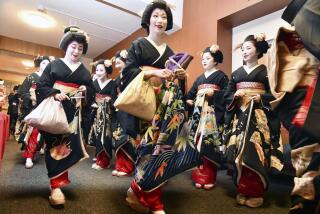Japanese Court Ruling Favors Foreigners
- Share via
TOKYO — TOKYO -- A district court Monday ordered a private bathhouse on Japan’s northern island of Hokkaido to pay a total of $25,000 to three foreign-born men who were refused entry on the basis of race.
The decision by the Sapporo District Court received widespread notice in a homogeneous nation where less than 1.5% of the population is non-Japanese.
“This is a significant ruling for Japanese society,” said Akira Fujimoto, associate professor of law at Kwassui Women’s College. “That said, it didn’t go far enough.”
The court found against the owner of the Yunohana Onsen in Otaru, a small port town, but rejected the contention that the government shared responsibility.
“The company’s behavior amounts to racism,” the court said. “Refusing entry to the baths goes beyond socially acceptable limits.”
The court was not convinced by the plaintiffs’ argument that the government, as a regulator of businesses, had an obligation to work against discrimination.
“We were very happy they said this is racial discrimination and that it’s punishable,” said university lecturer David Aldwinckle, 37, the lead plaintiff. “But they left a big legal loophole.”
The Yunohana Onsen manager, who gave only his last name, Kobayashi, said the decision against his bathhouse was regrettable. He labeled the case a publicity stunt.
“They knew our policy but nevertheless came with their children and newspaper reporters, showed they couldn’t bathe and suggested they were ‘humiliated,’ ” he said. “I don’t think that’s very sensible.”
Discrimination against outsiders is more openly tolerated in Japan than in many other parts of the developed world. “No Foreigners Allowed” signs at restaurants and bars can occasionally be seen, and foreigners tend to face more stringent requirements than Japanese when, for example, renting real estate or signing up for mobile phone service.
But Japanese also face restrictions in seemingly arbitrary ways. Some restaurants bar any new customers who haven’t been invited by longtime clients. And Japanese from another prefecture sometimes are required to obtain additional guarantors and promise other safeguards when renting apartments.
The bathhouse case dates to the late 1990s, when Russian sailors started patronizing Yunohana Onsen.
Local variations on the story abound, but the gist is that several groups of drunken sailors reportedly brought glass bottles of vodka inside the bathhouse, made a lot of noise, wore shoes indoors and washed themselves in the communal pool rather than before entering the water, all major faux pas.
“I hear Russian saunas are all a big party, but we don’t do that here,” Kobayashi said. “We tried to teach some Russians public bath manners, but it never improved.”
The behavior reportedly shocked the regular customers, who demanded refunds and threatened to go elsewhere. The bathhouse responded by barring foreigners with a “Japanese Only” sign in English on the door.
U.S.-born Aldwinckle, a naturalized citizen of Japan who has taken the name Debito Arudo, filed suit in February 2001, along with co-plaintiffs Olaf Karthaus, 39, of Mainz, Germany, and Ken Sutherland, 38, of Seattle.
The three based their suit on Japan’s 1995 accession to the International Convention on the Elimination of All Forms of Racial Discrimination.
The case has touched a nerve across Japan. Globalization and an aging population have increased the number of foreigners living and working in the world’s second-largest economy to about 1.6 million out of a population of 126 million.
On the other hand, many Japanese feel threatened by rapid social change, the protracted economic downturn and rising crime. This has spurred a backlash in some quarters against outsiders and the loss of traditional values.
“They took this measure against all foreigners because the chances of foreigners making trouble is higher than for Japanese,” said Daisuke Arikado, a member of World Strategy Institute, a right-wing group in favor of banning all foreigners from Japan.
The plaintiffs said they accept that discrimination exists and that foreigners in Japan have a responsibility to learn local customs. That said, Japan is the only member of the Organization for Economic Cooperation and Development without laws against discrimination.
Japanese cities and prefectures spend enormous sums touting their internationalization, said Hideko Ito, the Sapporo-based attorney who represented the plaintiffs.
“If they really want to be international,” she said, “they should improve their understanding toward foreigners living in Japan.”
*
Hisako Ueno in The Times’ Tokyo Bureau contributed to this report.
More to Read
Sign up for Essential California
The most important California stories and recommendations in your inbox every morning.
You may occasionally receive promotional content from the Los Angeles Times.










